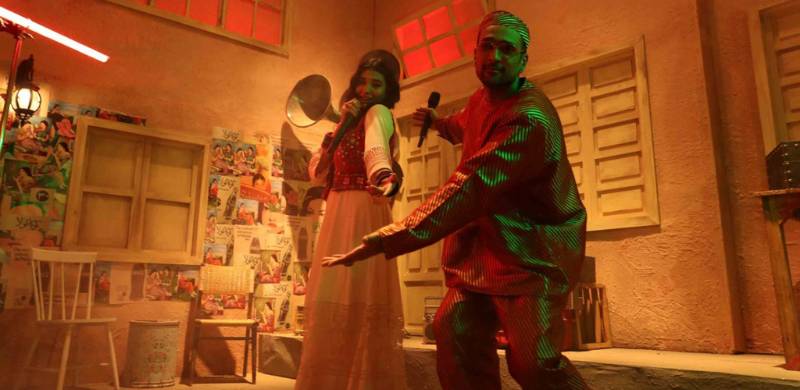
American publication The New Yorker published an article about Coke Studio Season 14's hit song Pasoori, and Pakistani social media had mixed reactions about it.
The article, written by journalist Priyanka Mattoo, is titled 'The pop song that's uniting India and Pakistan', and social media users say that's where the problem lies.
In the piece, Priyanka talks about how owing to the popularity of the song globally, but especially in India, it serves as a bridge between the two countries, uniting them through culture and music that shares the same historic roots across the border.
https://twitter.com/NewYorker/status/1523647986210852866?s=20&t=UhwzNNoPwuvxOdoibky05g
However, critics and cultural commentators on the internet think the article glosses over the massive imbalance that exists in the kind of cultural industries that India and Pakistan have, which makes the claim that Pasoori has 'unified the two nations' seem oversimplified.
https://twitter.com/aimanfrizvi/status/1523955845251354625
Some people have been arguing that it also inaccurately makes Pasoori out to be a champion of Pakistan-India unity, without taking into considerations that this is not the first Pakistani song to become massively popular across the border.
https://twitter.com/shehreenhere/status/1523948306023469056?s=21
Not just that, but the notion of the kind of 'unity' the song has created between India and Pakistan feels a bit tone-deaf, especially in a time where communal violence is rife on both sides, and in an age where citizens of neither city go visit the neighboring country without a considerable amount of hurdle jumping.
"Afterward, at dinner, I asked, now that he’s united the people of South Asia with his song, what was next?" Priyanka asks flippantly in the piece.
https://twitter.com/AvinaKohli/status/1523993293562204160
Saying that the author's oblivion to the sensitive geopolitical ecosystem that the two countries exist in, people are claiming the piece 'reeks of diaspora dumbness' where South Asian immigrants who reside in the West are so far removed from the ground realities and cultural disparities of their home countries.
Other criticisms of the song include its erasure of the Pakistani identity of the song, owing to the numerous instances of linking elements of the song and its video to either an Indian identity or an ambiguous South Asian one. Priyanka likens the musical notes to the Indian raga and the visual tones of the video to old-Bollywood technicolor films.
https://twitter.com/SophiaAQ/status/1523867207259897858
https://twitter.com/kookykarthik/status/1523999248773443589
Critics also pointed out the lack of spotlight Shae Gill, the co-singer of the hit song gets in the article, who is only mentioned three times in the entire piece.
However, there was no dearth of social media users who praised the New Yorker essay.
https://twitter.com/_sen_sharmila/status/1523749666529026048?s=20&t=S2UcV9BRZ3H2unK3v55v4A
https://twitter.com/BasharatPeer/status/1523642073861091329?s=20&t=vKX7K1BYLfcdxTu3pI2FWQ
https://twitter.com/karachiiite/status/1524082555456262144?s=20&t=wm2luvyKyIyf0RaFw6rweg
The article, written by journalist Priyanka Mattoo, is titled 'The pop song that's uniting India and Pakistan', and social media users say that's where the problem lies.
In the piece, Priyanka talks about how owing to the popularity of the song globally, but especially in India, it serves as a bridge between the two countries, uniting them through culture and music that shares the same historic roots across the border.
https://twitter.com/NewYorker/status/1523647986210852866?s=20&t=UhwzNNoPwuvxOdoibky05g
However, critics and cultural commentators on the internet think the article glosses over the massive imbalance that exists in the kind of cultural industries that India and Pakistan have, which makes the claim that Pasoori has 'unified the two nations' seem oversimplified.
https://twitter.com/aimanfrizvi/status/1523955845251354625
Some people have been arguing that it also inaccurately makes Pasoori out to be a champion of Pakistan-India unity, without taking into considerations that this is not the first Pakistani song to become massively popular across the border.
https://twitter.com/shehreenhere/status/1523948306023469056?s=21
Not just that, but the notion of the kind of 'unity' the song has created between India and Pakistan feels a bit tone-deaf, especially in a time where communal violence is rife on both sides, and in an age where citizens of neither city go visit the neighboring country without a considerable amount of hurdle jumping.
"Afterward, at dinner, I asked, now that he’s united the people of South Asia with his song, what was next?" Priyanka asks flippantly in the piece.
https://twitter.com/AvinaKohli/status/1523993293562204160
Saying that the author's oblivion to the sensitive geopolitical ecosystem that the two countries exist in, people are claiming the piece 'reeks of diaspora dumbness' where South Asian immigrants who reside in the West are so far removed from the ground realities and cultural disparities of their home countries.
Other criticisms of the song include its erasure of the Pakistani identity of the song, owing to the numerous instances of linking elements of the song and its video to either an Indian identity or an ambiguous South Asian one. Priyanka likens the musical notes to the Indian raga and the visual tones of the video to old-Bollywood technicolor films.
https://twitter.com/SophiaAQ/status/1523867207259897858
https://twitter.com/kookykarthik/status/1523999248773443589
Critics also pointed out the lack of spotlight Shae Gill, the co-singer of the hit song gets in the article, who is only mentioned three times in the entire piece.
However, there was no dearth of social media users who praised the New Yorker essay.
https://twitter.com/_sen_sharmila/status/1523749666529026048?s=20&t=S2UcV9BRZ3H2unK3v55v4A
https://twitter.com/BasharatPeer/status/1523642073861091329?s=20&t=vKX7K1BYLfcdxTu3pI2FWQ
https://twitter.com/karachiiite/status/1524082555456262144?s=20&t=wm2luvyKyIyf0RaFw6rweg

